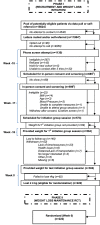Recruitment and Retention for a Weight Loss Maintenance Trial Involving Weight Loss Prior to Randomization
- PMID: 28090340
- PMCID: PMC5192533
- DOI: 10.1002/osp4.58
Recruitment and Retention for a Weight Loss Maintenance Trial Involving Weight Loss Prior to Randomization
Abstract
Objective: A weight loss maintenance trial involving weight loss prior to randomization is challenging to implement due to the potential for dropout and insufficient weight loss. We examined rates and correlates of non-initiation, dropout, and insufficient weight loss during a weight loss maintenance trial.
Methods: The MAINTAIN trial involved a 16-week weight loss program followed by randomization among participants losing at least 4 kg. Psychosocial measures were administered during a screening visit. Weight was obtained at the first group session and 16 weeks later to determine eligibility for randomization.
Results: Of 573 patients who screened as eligible, 69 failed to initiate the weight loss program. In adjusted analyses, failure to initiate was associated with lower age, lack of a support person, and less encouragement for making dietary changes. Among participants who initiated, 200 dropped out, 82 lost insufficient weight, and 222 lost sufficient weight for randomization. Compared to losing sufficient weight, dropping out was associated with younger age and tobacco use, whereas losing insufficient weight was associated with non-White race and controlled motivation for physical activity.
Conclusions: Studies should be conducted to evaluate strategies to maximize recruitment and retention of subgroups that are less likely to initiate and be retained in weight loss maintenance trials.
Keywords: clinical trials; recruitment; retention; weight loss maintenance.
Figures

References
-
- Jensen MD, Ryan DH, Apovian CM, et al. 2013 AHA/ACC/TOS guideline for the management of overweight and obesity in adults: a report of the American College of Cardiology/American Heart Association Task Force on Practice Guidelines and The Obesity Society. Journal of the American College of Cardiology 2014; 63(25 Pt B): 2985–3023. - PubMed
-
- Weiss EC, Galuska DA, Kettel Khan L, Gillespie C, Serdula MK. Weight regain in U.S. adults who experienced substantial weight loss, 1999‐2002. American Journal of Preventive Medicine 2007; 33: 34–40. - PubMed
-
- Wadden TA, Butryn ML, Byrne KJ. Efficacy of lifestyle modification for long‐term weight control. Obesity Research 2004; 12(Suppl): 151S–162S. - PubMed
-
- Anderson JW, Konz EC, Frederich RC, Wood CL. Long‐term weight‐loss maintenance: A meta‐analysis of US studies. American Journal of Clinical Nutrition 2001; 74: 579–584. - PubMed
Grants and funding
LinkOut - more resources
Full Text Sources
Other Literature Sources
